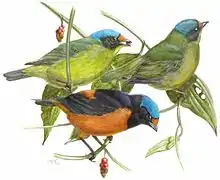| Chlorophonia | |
|---|---|
 | |
| Golden-browed chlorophonia (Chlorophonia callophrys) | |
| Scientific classification | |
| Domain: | Eukaryota |
| Kingdom: | Animalia |
| Phylum: | Chordata |
| Class: | Aves |
| Order: | Passeriformes |
| Family: | Fringillidae |
| Subfamily: | Euphoniinae |
| Genus: | Chlorophonia Bonaparte, 1851 |
| Type species | |
| Tanagra viridis[1] = Pipra cyanea Vieillot, 1819 | |
Chlorophonia is a genus of finches in the family Fringillidae. The Chlorophonias are endemic to the Neotropics. They are small, mostly bright green birds that inhabit humid forests and nearby habitats, especially in highlands.
The genus Chlorophonia was erected in 1851 by the French ornithologist Charles Lucien Bonaparte.[2] The name combines the Ancient Greek khlōros meaning "green" with the genus name Euphonia that had been introduced in 1806 by the French zoologist Anselme Gaëtan Desmarest.[3] The type species was designated as the blue-naped chlorophonia (Chlorophonia cyaneaby) by the English zoologist George Robert Gray in 1855.[4][5] The genus was once considered as a member of the tanager family, Thraupidae.[6]
Species
The genus contains ten species:[7]
| Image | Common Name | Scientific name | Distribution |
|---|---|---|---|
.jpg.webp) | Elegant euphonia | Chlorophonia elegantissima | Belize, Costa Rica, El Salvador, Guatemala, Honduras, Mexico, Nicaragua, and Panama. |
| Hispaniolan euphonia | Chlorophonia musica | Hispaniola (Dominican Republic and Haiti) | |
 |
Puerto Rican euphonia | Chlorophonia sclateri | Puerto Rico |
| Lesser Antillean euphonia | Chlorophonia flavifrons | Lesser Antilles | |
.jpg.webp) |
Golden-rumped euphonia | Chlorophonia cyanocephala | Argentina, Bolivia, Brazil, Colombia, Ecuador, French Guiana, Guyana, Paraguay, Peru, Suriname, Trinidad and Tobago, and Venezuela. |
.jpg.webp) | Blue-naped chlorophonia | Chlorophonia cyanea | south-eastern Brazil, eastern Paraguay and north-eastern Argentina, the Andes from Bolivia in south to Venezuela in north, the Perijá and Santa Marta Mountains, the Venezuelan Coastal Range, and the Tepuis. |
_Clorofonia_ferruginosa_(male).jpg.webp) | Chestnut-breasted chlorophonia | Chlorophonia pyrrhophrys | Colombia, Ecuador, Peru, and Venezuela. |
 |
Yellow-collared chlorophonia | Chlorophonia flavirostris | Colombia, Ecuador, and Panama. |
 | Blue-crowned chlorophonia | Chlorophonia occipitalis | El Salvador, Panama, Guatemala, Honduras, Mexico, and Nicaragua. |
 | Golden-browed chlorophonia | Chlorophonia callophrys | Costa Rica and Panama. |
References
- ↑ "Fringillidae". aviansystematics.org. The Trust for Avian Systematics. Retrieved 2023-07-16.
- ↑ Bonaparte, Charles Lucien (1851). "Note sur les Tangaras, leurs affinités et descriptions d'espèce nouvelles". Revue et magasin de zoologie pure et appliquée. 2nd series (in French). 3: 137.
- ↑ Jobling, James A. (2010). The Helm Dictionary of Scientific Bird Names. London: Christopher Helm. p. 103. ISBN 978-1-4081-2501-4.
- ↑ Gray, George Robert (1855). Catalogue of the Genera and Subgenera of Birds Contained in the British Museum. London: British Museum. p. 74.
- ↑ Paynter, Raymond A. Jr, ed. (1970). Check-List of Birds of the World. Vol. 13. Cambridge, Massachusetts: Museum of Comparative Zoology. p. 355.
- ↑ Banks, Richard C.; Cicero, Carla; Dunn, Jon L.; Kratter, Andrew W.; Rasmussen, Pamela C.; Remsen, J.V. Jr.; Rising, James D.; Stotz, Douglas F. (2003). "Forty-fourth supplement to the American Ornithologists' Union Check-List of North American Birds". The Auk. 120 (3): 923–931. doi:10.1642/0004-8038(2003)120[0923:FSTTAO]2.0.CO;2.
- ↑ Gill, Frank; Donsker, David (eds.). "Finches, euphonias". World Bird List Version 5.2. International Ornithologists' Union. Retrieved 5 June 2015.